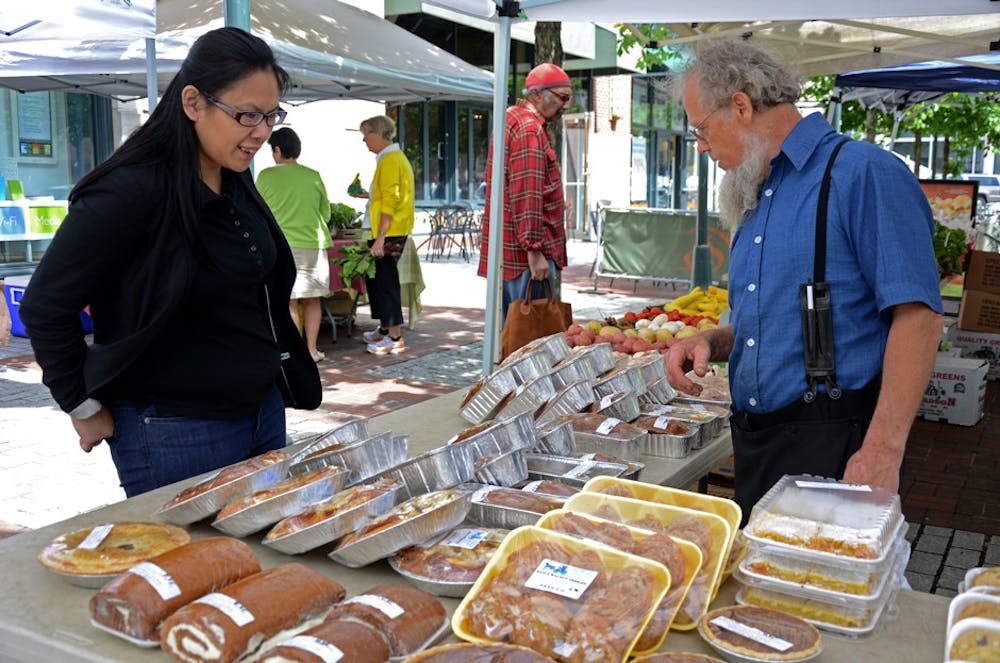
John King from Hilltop Gardens helps a customer at the University City Square Farmers’ Market. The market — which is open from 10 a.m. to 3 p.m. on Wednesdays — offers fruits, vegetables, baked goods, beef, chocolate, flowers and more.
Credit: , Christina Prudencio, ,While most Penn students are gone for the summer, since mid-May the University City Square Farmers’ Market has been selling fresh produce on campus.
Just as during the schoolyear, the market is open from 10 a.m. to 3 p.m. on Wednesdays on the corner of 36th and Walnut streets. Farm to City, a Philadelphia-based organization promoting locally grown food, operates the market while Penn acts as a local partner.
The new season began in May this year, a bit earlier than usual due to the warm winter. The market stays open until around Thanksgiving, but remained open until Christmas time last year.
Vendors typically sell fresh fruits and vegetables, baked goods, beef from grass-fed cows, jams, chocolate and flowers. Most of the products are local, organic and in-season.
People passing by from Walnut Street will first notice Beechwood Orchards. Shawn Garretson, who helps his family run the farm, was selling blueberries and cherries this week. While June 13 was the last day he would be selling strawberries, next week he plans to sell peaches, plums and apricots.
Beechwood will accept Penn Cash and Dining Dollars once the fall semester starts.
Garretson said lines start to get long in the fall when students line up for local, organic apples. Beechwood’s produce comes from Biglerville, Pa.
While walking past the bookstore, Rising Wharton junior Sam Hougie stopped by this week’s sale to browse through Beechwood’s produce. “It’s worth it to pay a little more for farmers’ markets,” he said. “It’s a nice change when I get a chance to come.”
Garretson said that not too many customers complain about pricing. “Everything is a lot fresher than what you’ll find in a supermarket. We have lots of regular, loyal customers,” he added.
1991 College graduate Michelle Weissman was selling meat with Philadelphia Cowshare. Yesterday was her first day on the job. For $348.50, she’ll sell an eighth of a grass-fed cow, and said that “it might take up your whole freezer.”
She was selling several different cuts of meat, including hot dogs, ground beef, patties and fillets. Weissman said cows naturally prefer to eat grass, and when they are fed other foods they are not as healthy.
“It’s a totally different taste and texture,” Weissman said of the meat. Not only is the process more humane for the cows and farmers, she added, but studies also show it is a lot healthier for people to eat meat that has not been treated with hormones and antibiotics.
“Anything the animal consumes goes into you when you eat it,” Weissman said.
Philadelphia Cowshare’s farms are all in Pennsylvania with the exception of one in upstate New York.
John King from Hilltop Gardens has been selling at Penn for eight years. Like Garretson, he said business always picks up in the fall when there is more produce in-season and more students around. Hilltop will also accept Penn Cash and Dining Dollars when the fall semester starts.
King is happy to show customers an album with pictures of his farm in Paradise, Pa. He sells produce, jams, jelly, baked goods, yogurt and flowers.
King said most of what he sells cannot be found in supermarkets, and anything organic will probably be more expensive.
“We’ve had people say we’re too expensive then come back and buy a week later,” he said.
While Robert Powers from Big Sky Bakery was also selling baked goods, he said there is no competition between vendors.
“We carry something different and don’t price based on what anyone else is selling,” Powers said. “There are never any conflicts.”
This is Powers’ first year selling at Penn. He said customers are “knowledgeable and friendly” and selling has been “very beneficial.”
While Beechwood and Hilltop were both selling jams and asparagus, Garretson said all vendors tend to sell different products.
“We shouldn’t have competition,” he said. “We need each other to make the farmers’ market work.”
The Daily Pennsylvanian is an independent, student-run newspaper. Please consider making a donation to support the coverage that shapes the University. Your generosity ensures a future of strong journalism at Penn.
DonatePlease note All comments are eligible for publication in The Daily Pennsylvanian.








